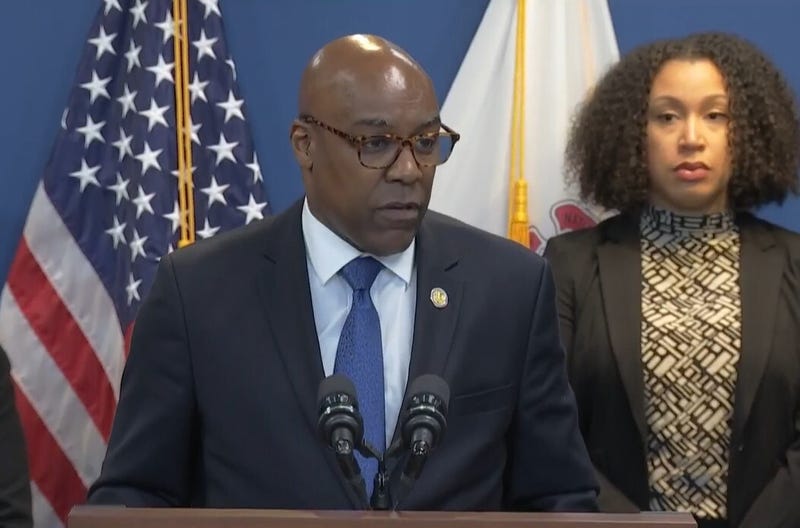
CHICAGO (WBBM NEWSRADIO) — A new, lengthy report from the Illinois Attorney General’s Office found hundreds more Catholic clergy members abused children across the Illinois Dioceses than had been previously reported by church leaders prior to its investigation.
Attorney General Kwame Raoul announced Tuesday that investigators found that 451 Catholic clergy sexually abused 1,997 children in Illinois between 1950 and 2019 — more than four times the number the church had publicly disclosed prior to the beginning of the investigation.
The Archdiocese of Chicago accounted for a large percentage of that increase. When the investigation was announced in 2018, the Archdiocese of Chicago had only disclosed 68 substantiated child sex abusers. By 2023, that number grew to 275, with 70 names added in October 2022.
In response to the report, Cardinal Blase Cupich said the Archdiocese of Chicago has “disclosed all accusations” since 2002.
"On behalf of the archdiocese, I apologize to all who have been harmed by the failure to prevent and properly respond to child sexual abuse by clerics ... we have devoted ourselves to rooting out this problem and providing healing to victims," Cupich said.
While the state found that the Archdiocese of Chicago has improved its handling of child sex abuse claims against Catholic clerics over the past 30 years, its report also provided an outline of how child sex abusers were able to escape accountability for, in some cases, decades.
Prior to 1960, the Illinois Attorney General’s Office said the Chicago Archdiocese handled claims of child sexual abuse under a so-called “confessional model,” in which investigators wrote that priests kept secret any admissions of abuse.
That method eventually gave way to what investigators described as a “therapeutic approach,” through which officials said the archdiocese had an end goal of returning an accused cleric to a ministry.
“Once the cleric was deemed rehabilitated … the cleric was placed back into ministry, nearly always at a parish different from the one where the alleged abuse occurred,” officials wrote.
The attorney general’s office reported that out of 32 clerics who had been accused of abuse between 1960 and 1992, the archdiocese’s own records showed that more than half of them were accused of additional abuse.
Among them was Fr. Robert Mayer, who was an associate pastor at Saint Mary in Lake Forest in the 1970s. According to a survivor who spoke to attorney general investigators, Mayer provided alcohol to and made sexual advances toward teenagers in the rectory of the church in 1977.
Investigators wrote that the Chicago Archdiocese did nothing to stop Mayer’s behavior other than “moving him from one parish to the next.” After Saint Mary, the report showed Mayer was assigned to Saint Edna in Arlington Heights, where staff members at the church complained in 1982 that he provided alcohol to kids and made sexual advances toward a teen.
Over the next eight years Mayer was the subject of more accusations and was moved to three other churches, including Saint Stephen in Des Plaines, Saint Dionysius in Cicero, and Saint Odilo in Berwyn.
“At least one church official acknowledged this was a risky approach: ‘There has always been a lot of smoke surrounding Bob, and there is no guarantee that the allegations of sexual misconduct won’t surface again,”’ investigators wrote.
He was eventually charged with aggravated criminal sexual abuse of a girl in December 1991.
In the wake of Mayer’s arrest, investigators wrote that the Archdiocese of Chicago decided to take a new approach to addressing sexual abuse by clergy. In 1992, they created an independent review board to handle claims of child sex abuse.
“Among the first of its kind, the review board in large part took the evaluation of child sex abuse claims out of the archdiocese’s hands and put it in the hands of a board largely made up of laypeople,” wrote the attorney general’s office.
In his statement to the press, Cupich noted that the archdiocese also created a victim-survivor assistance program in 1992, which he described as "one of the largest in the nation."
Although the review board was a step in the right direction, investigators found that it still relied on the archdiocese submitting allegations of abuse. According to the report, church officials refused to do so when the survivor wished to remain anonymous.
Years later, archdiocese officials neglected to investigate another anonymous complaint in 2003 against Fr. Daniel McCormack, who was arrested three years later after sexually abusing five children while he was a priest at St. Agatha’s Parish.
After an audit into its own system that year, the archdiocese announced that it was releasing the names of “all living priests against whom substantiated claims of child sex abuse had been made since 1950.”
"Since 2006, we have published the names of diocesan priests with substantiated allegations of abuse on our website," Cupich said. "In 2014, we published more than 20,000 documents from these priests’ files. These documents remain on our website."
Investigators called the step to publish names of living priests accused of abuse “significant." They added, though, that it offered no solace to survivors whose abusers had already died. Since 1992, the archdiocese had a policy of not bringing forward claims of abuse against clerics who were dead.
“It was not until October 2022, under pressure from the Attorney General, that the archdiocese changed its policy,” state officials wrote. “It now reviews new allegations against deceased clerics as it does any other child sex abuse allegation against clerics.”
That decision resulted in the addition of 70 clerics to the Archdiocese of Chicago’s “substantiated child sex abuser” list on Oct. 14, 2022.
Raoul acknowledged that many survivors were unable to get justice before their abusers died.
Instead, the attorney general said he hopes the report will lead to a “public accounting” and a healing for survivors “who have long suffered in silence.”
Listen to our new podcast Courier Pigeon
Listen to WBBM Newsradio now on Audacy!


